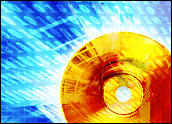
Twenty-five years ago Friday, the very first compact disc was produced by Royal Philips Electronics at a Philips factory in Langenhagen, Germany. It was Aug. 17, 1982, and the CD was “The Visitors” by ABBA.
Fast forward to today, and it’s hard to imagine life before CDs were around. At the same time, though, it’s not entirely clear what the next 25 years will bring for the medium. More than 200 billion CDs have been sold since that momentous day, Philips says, and they’re still used heavily throughout the world.
Digital download aficionados like to proclaim that the end of the CD is near, but by many accounts, that may be premature. The technology will disappear eventually, sure — but probably not anytime soon.
Springboard for Innovation
Philips and Sony partnered to develop the CD through a joint task force of engineers that began work in 1979.
“When Philips teamed up with Sony to develop the CD, our first target was to win over the world for the CD,” said Piet Kramer, who at the time was a member of the optical group at Philips that made a significant contribution to the CD technology.
“We did this by collaborating openly to agree on a new standard,” he explained. “For Philips, this open innovation was a new approach — and it paid off. In the late ’70s and early ’80s, we never imagined that one day the computing and entertainment industries would also opt for the digital CD for storing the growing volume of data for computer programs and movies.”
Digital Revolution
The invention of the CD ushered in a technological revolution in the music industry as the shift from analog to digital music technology began. The CD ultimately sparked further innovation in digital entertainment as well, such as DVD technology and Blu-ray optical media.
“The compact disc has proven its significance in bringing the highest quality of music to consumers who wish to enjoy scratch free music,” said Lucas Covers, senior vice president and chief marketing officer for Philips Consumer Electronics. “The enormous success of the CD over the last 25 years has opened many new opportunities for consumers to make the most of their music at home and on the move.”
Indeed, the CD managed to displace both cassette and vinyl record albums “almost immediately because it offered three critical things,” Michael Gartenberg, an analyst with JupiterResearch, told TechNewsWorld.
Changing Everything
First, with its jewelry-like appearance, high-quality sound and new features such as random access, the CD offered consumers the ability to see and hear the difference in the new technology immediately, Gartenberg noted.
The technology also provided many incentives for the music hardware companies, which took advantage of the opportunity to sell new players. Finally, it provided similarly enticing incentives to the music companies, which jumped at the opportunity “to sell their existing content all over again on the new format,” Gartenberg explained.
The result: “New formats come along very rarely, but the CD changed everything,” he said.
Days Gone By
Nevertheless, with the emergence of digital downloads and technologies like the iPod, many argue that the CD will soon be obsolete.
“It’s worth celebrating the development much like it’s worth celebrating the birth of the original transistor, but I don’t think there’s a shadow of a doubt that the prerecorded CD will become a thing of the past,” Phil Leigh, senior analyst with Inside Digital Media, told TechNewsWorld. “It has seen its best days.”
CDs will be phased out partially in the next 15 years, with their final obsolescence arriving in 30 years or so, Leigh predicted.
Most observers agree the technology can’t last forever, but not everyone believes it will disappear that quickly.
Like Paper
“The analogy I like to use is that CDs are like paper,” John Barrett, director of research for Parks Associates, told TechNewsWorld. “When office automation began, everyone started talking about the promise of the paperless office, but that just hasn’t happened.”
Consumers have a strong affinity for the medium, and will probably continue to use it even more than they do today, Barrett predicted. The difference will be in how the CDs are used — “we’ll burn our own, trade back and forth, make our own mixes,” he explained. “We’re still a long way from the digital ecosystem where everything is electronically zipped around the home, office, car and portable device,” he added.
While an increasing number of consumers will undoubtedly begin using digital downloads, there still remains the fact that close to a third of U.S. households still have no Internet connection, Barrett pointed out. “They’ll be using CDs for a while to come.”
A Good Value
Indeed, with their relatively low prices, lack of digital rights management (DRM) protection and quality surpassing that of a digital download, “we think the CD will be around for quite a while,” agreed Gartenberg. “It’s still a really good value for consumers.”
The technology may be particularly likely to linger in cars, many of which until recently were still produced with cassette players, Mark Fitzgerald, an analyst at Strategy Analytics, told TechNewsWorld.
“There have been rumblings from some suppliers in the automotive world that want to get rid of CD drives in vehicles so they can use the space for something else, but auto makers want to keep them,” Fitzgerald said. “The auto makers don’t want to alienate anyone.”
End of the Line
Such drives will probably remain in vehicles for at least another four to five years, Fitzgerald predicted. “Even though we have MP3, people are still burning CDs,” he said. “They’re still cheap and easy, and consumers still use CD players in many areas of their homes and cars.”
However long the technology lasts, the birth of the CD is particularly notable because the technology is probably the last physical media standard for music, Barrett noted.
“There’s no motivation or reason to come up with another physical media format, so the CD appears to be the end of the line,” he concluded. “Happy birthday to the last of a generation.”




















































